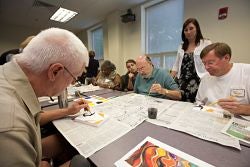Group supports stroke survivors and their families

Left to right, Irvin Carsten, foreground, Jackie Mills, graduate student Caitlin Webb, Harold Roeder, graduate student Kellye Bigelow, and Tom Egerton practice communication skills while painting Tuesday in the ECU Aphasia Support Group. Photo by Cliff Hollis.
GREENVILLE, N.C. — Jackie Mills couldn’t say a word the first two months after her stroke in October. But now, she talks on the phone and has made great progress, said husband Harold Mills.
They both attend the Aphasia Support Group at ECU.
Aphasia is difficulty or loss in communication often caused by a stroke or brain injury. June is National Aphasia Awareness Month.
The support group has been meeting more than a year, but for six weeks this summer has expanded to three-hour sessions each Tuesday morning in the College of Allied Health Sciences.
Graduate students in communication sciences and disorders lead discussions and activities under the direction of Clinical Supervisor Sherri Winslow and Professor Monica Hough. Participants practice communication skills while playing computer games and painting. Attending the group gives caregivers and spouses of those who live with aphasia a way to connect as well.
“I’m learning something from it,” said Harold Mills of Kinston. “I see different people who are all stroke victims but it affects you all in different ways. Stroke doesn’t care what color you are or where you come from. We’re all in this thing together and we try to help one another.”
Harold Roeder suffered a massive stroke in 2002 a day after successful quadruple bypass surgery. He lost his ability to read, speak or write, and could only say “no” for the first year and a half after the stroke.
“I really think this has helped us quite a bit,” said his wife, Marcia Roeder. “The group dynamics is terrific. I know he likes the group. They help each other.”
Through small and large group activities, stroke survivors can participate at their own speed and ability. “They are successful in their own group,” she said. “To people who have had a stroke, it’s a benefit.”
Aphasia affects people in different ways. Some people may be able to speak clearly, but have trouble understanding conversation. Others may comprehend everything, but may only be able to speak a few words. The disorder does not affect a person’s intelligence, although it can affect reading and writing.
“To me, aphasia is so confusing. They know what the words are, but they can’t come out,” Marcia Roeder said. Her husband’s comprehension and memory is very good, and he maintains his sense of humor, wearing his name tag sideways during a recent session. “For a man of few words, he makes himself understood.”
For Mills, he is practicing patience with his wife, who is also diabetic. “The doctor said it will be a slow process,” he said. “I’m in it for the duration. I’m behind her all the way.”
About 40 percent of people with stroke, and about one-third of people who suffer severe head injuries, will get aphasia.
“I would sure recommend this type of group to anyone, even if they think it won’t help,” Roeder said. “They’ve really structured it well.”
The group gives participants time to communicate in their own way, Winslow said. “We emphasize that you can write it, you can speak it, you can use your gestures. We are there to help you get it out.”
For more information on ECU’s Aphasia Support Group, call Sherri Winslow at 744-6142 or e-mail winslowsh@ecu.edu.